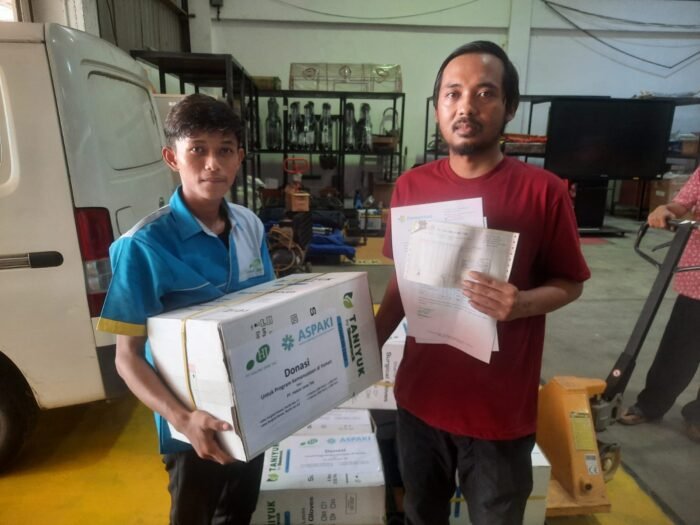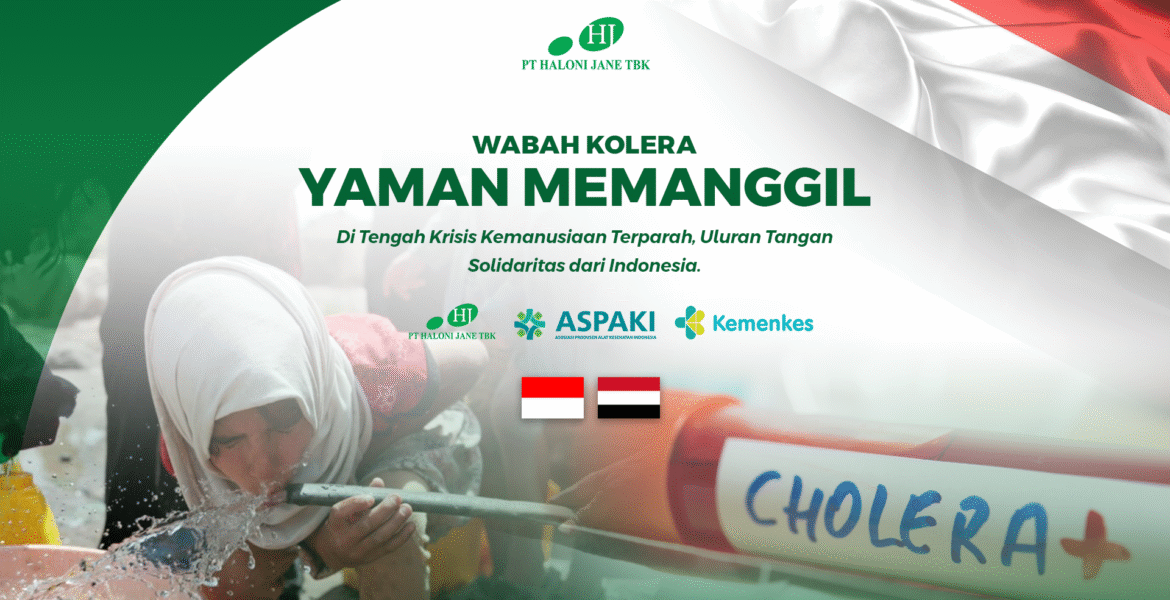Amidst the World’s Worst Cholera Crisis, Haloni Jane, ASPAKI, and Indonesia’s Ministry of Health Collaborate to Send Aid
A silent crisis is unfolding in Yemen. Far from the global spotlight, the country, according to the latest WHO report, bears the highest global burden of cholera. Reports recorded nearly 250,000 suspected cases and 861 related deaths as of December 1, 2024. These are not just statistics; they are the stories of fathers, mothers, and children fighting to survive. Amidst this devastation, the need for effective Yemen cholera crisis aid is more critical than ever.
Amidst the rubble of over a decade of conflict and a fragile health infrastructure, the true heroes are the local healthcare workers. They stand on the front lines, serving as the only hope for hundreds of thousands of threatened citizens.
Understanding Cholera: The Threat of Rapid, Fatal Dehydration
To understand the depth of the crisis, it is essential to know what cholera is. The bacterium Vibrio cholerae causes an intestinal infection known as acute diarrhoeal disease. Primarily, transmission occurs through the consumption of contaminated water or food.
The disease can be incredibly dangerous due to its rapid impact. Key symptoms include:
- Severe watery diarrhea (often described as “rice-water stool”).
- Vomiting.
- Leg cramps.
This rapid loss of body fluids leads to extreme dehydration and electrolyte imbalance. Without prompt treatment, a person can die within hours. Fortunately, healthcare workers can easily treat the disease with oral rehydration solution (ORS) and intravenous fluids. Therefore, the key is the speed of treatment and access to clean health facilities, where medical gloves serve as a vital shield.
The Deepening Crisis and the Need for Aid
The struggle for these healthcare workers is becoming increasingly difficult. This outbreak is not just about a disease but a battle against limited resources. For instance, a UN report highlights alarming facts:
- Global Burden: Yemen accounts for 35% of all cholera cases worldwide.
- Critical Funding Shortage: The humanitarian response faces a $20 million funding gap.
As a result, their primary weapons in this fight have been stripped away. The crisis forced 47 Diarrhoea Treatment Centres (DTCs) and 234 Oral Rehydration Corners (ORCs) to close between March and November. Without immediate support, dozens more facilities are set to follow. In short, these medical heroes are running out of ammunition.
A Helping Hand from Indonesia: Providing Yemen Cholera Crisis Aid
However, in this dire situation, answering the call for effective Yemen cholera crisis aid is a moral imperative. PT Haloni Jane Tbk, a medical glove manufacturer with decades of experience, could not stand idly by. We believe our mission to “Protect the Hands that Heal” knows no borders.
Through a trusted, strategic collaboration, PT Haloni Jane Tbk officially handed over a donation of 2,000 pairs of Surgical Sterile Gloves to the Indonesian Government via the Ministry of Health’s Crisis Center, to be delivered directly to Yemen.

This is no ordinary aid. The choice of Surgical Sterile Gloves holds critical meaning and benefits amidst an epidemic:
- Sterility to Prevent Secondary Infections: Cholera patients suffer from severe dehydration, which weakens their immune systems. A simple procedure like inserting an IV can become an entry point for deadly new infections. The sterile nature of these gloves prevents the transfer of microorganisms, protecting patients from further complications.
- Surgical Quality for Maximum Security: In crowded emergency facilities, healthcare workers need the most reliable protection. Surgical gloves offer a much higher standard of durability and precision, providing maximum security and ensuring no risk of tears during life-saving procedures.
Yemen cholera crisis aid : A Promise to Keep Protecting
This donation may be a drop in an ocean of need, where 18.2 million people require humanitarian assistance. Nevertheless, it is a drop that brings hope. This aid ensures that healthcare workers can continue their duties without fear, consequently preventing them from becoming the next victims and helping to break the chain of cholera transmission.
PT Haloni Jane Tbk, in partnership with ASPAKI and the Indonesian Ministry of Health, is committed to being part of the global health solution. Because ultimately, protecting one healthcare worker’s hands in Yemen means protecting the dozens of lives they care for. This is our promise, from Indonesia to the world.




